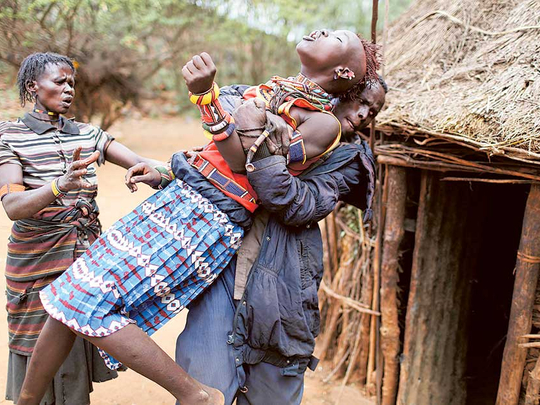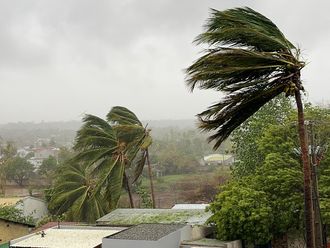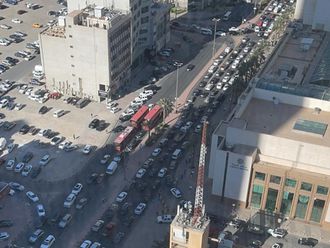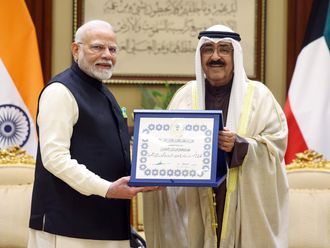
Nairobi: The number of child brides in Africa will more than double by 2050 if current trends persist because of rapid population growth and limited social change, the United Nations children’s fund (Unicef) said on Thursday.
Africa will overtake South Asia as the region with the largest number of child brides, their number soaring to 310 million, more than 40 per cent of the global total, in 2050, from 125 million, 25 per cent of the total, today.
“The sheer number of girls affected — and what this means in terms of lost childhoods and shattered futures — underline the urgency of banning the practice of child marriage once and for all,” Unicef executive director Anthony Lake said in a statement at the start of a two-day African Union summit on ending child marriage.
“Each child bride is an individual tragedy. An increase in their number is intolerable.” The AU launched a campaign earlier this year to end child marriage. The minimum legal marriage age is 15 in about a dozen African countries, and change is gradual.
Just over one in three African girls marry before the age of 18, most commonly in poor, rural families which often receive a bride price or dowry in exchange for their daughter.
The proportion of young women in Africa who married before the age of 18 has dropped to 34 per cent now from 44 per cent in 1990, but other continents’ populations are growing more slowly, and their rates of child marriage are falling faster.
Africa’s population of girls under 18 is predicted to rise from 275 million today — 25 per cent of the global total — to 465 million by 2050, 38 per cent of the total.
No change among poorest
Virtually no progress has been made among the poorest African families, where the likelihood that a girl will marry as a child is as high today as it was 25 years ago.
In families that struggle to feed, clothe and educate their children, marriage is often seen as the best chance to secure a girl’s future and safeguard her chastity.
“They see child marriage as the best chance to protect their daughters,” said Unicef’s Associate Director for Child Protection, Cornelius Williams.
“If they had access to school, they would have a different perception of their girls — as income earners, bosses, teachers, medical doctors, lawyers and policewomen. The practice would die naturally.” It is also important to increase girls’ access to reproductive health services so that they have fewer, safer pregnancies and can break the cycle of poverty, Unicef said.
Child brides are more likely to die as a result of pregnancy and childbirth and to be beaten, raped or infected with HIV by their husbands than women who marry later.
Children born to teenage mothers have a higher risk of being stillborn, dying soon after birth and having low birthweight.
African governments also need to make sure that more girls’ births are registered so that their age is known, and to enforce laws prohibiting child marriage, Unicef said.
“We are not seeing the change that is required,” Williams said. “We need to accelerate it.”
'I didn't know there were risks', African child brides speak out
The number of child brides in Africa will more than double by 2050 if current trends persist because of rapid population growth and limited social change, the United Nations Children's Fund (UNICEF) said on Thursday.
Africa will overtake South Asia as the region with the largest number of child brides, their number soaring to 310 million, more than 40 percent of the global total, in 2050, from 125 million, 25 percent of the total, today.
Several child brides from West and Central Africa shared their stories of marriage and motherhood.
Fatimetou, 16, from Mauritania, is seeking a divorce
My parents married me off when I was 13. I wasn't told about it. A friend came to tell me, and I cried.
Before, my parents told me he was a very good man. But then when I got married, I realised that everything was a lie. When I told my family, they said that actually I was the problem and they told me to go back to my husband.
I kept returning to my family and they kept sending me back,
so I had no choice but to sleep on the street.
I had to continue going to school, for myself. I couldn't give up on that. I like maths and Arabic. My grades are quite good. I think I want to be a doctor or an engineer.
I asked my mother why she married me, and she said it was in my own interests, for my reputation. When my mother realized that actually I can't bear him at all and that it was affecting my health and my mind, that's when she decided to be supportive.
Hopefully I can get a divorce because I was forced to marry him and actually child marriage is illegal in Mauritania.
I am optimistic that I can get out of this marriage. It has been three years now, and it seems like maybe now it might be over. When the marriage is ended I will be so happy.
Amina, 15, is the mother of a baby in Sierra Leone
I went to school up to class four, after which my mother said that I should stop going to school because I had to work carrying palm fruit from the farm to where it is processed into palm wine, and to help with the farm work in general.
I was not happy that I had to stop going to school. Other people in the community were also not happy with my mother for taking me out of school.
I remember how I got married. My friend Kadie asked me to come to his farm. Foday was staying there and, when he saw me, he liked me and came and said that he loved me. I liked him also. So his family went to my parents to tell them that Foday was interested in me. That's how it started.
We are happily married. My husband is a good man, and I am good to him as well. Our baby Ibrahim is six months old. I would like to have six children.
I don't regret that I got married. I think I made the right decision. Maybe I was too young, but I don't know what age is best for getting married.
My advice to young girls is that they should not do like others - they should take their education seriously. They should not encourage foolishness but instead be serious with their school so that they can be somebody in the future.
Mariam, from Niger, suffered a fistula during pregnancy
I wanted to get married. I was 15. I knew I was a child, but I didn't know there were risks. If I had been conscious of this, I would have waited until I got older.
I suffered from a fistula in my second pregnancy. I now share my experience with other women about the risks of early pregnancy.
Now I know how to sew and I earn money. It's good for me. I speak a lot with the other women. I try to advise them and tell them what happened to me. They told me they won't marry the girls so young any more.
Brigitte, 17, mother of two in Democratic Republic of Congo
I gave birth to my first child when I was 13 when I was still in my first year of secondary school. Due to my pregnancy, I wasn't able to finish the school year.
My husband Justin was about 15 years old and was in his fourth year of secondary school. Sometime later, and because he likes to flirt, he left for a mining centre in South Kivu.
He only came back in 2014 when I had returned to school.
After a while, I became pregnant again. He then left once again and has never returned.
I didn't gain anything good out of this, only difficulties -the two pregnancies and medical care for my children when they're ill. Simply put, it's my mother who takes care of my children and me.
I will be able to go back to school if I find someone who can take responsibility for me because my mother's resources are becoming more and more limited.












